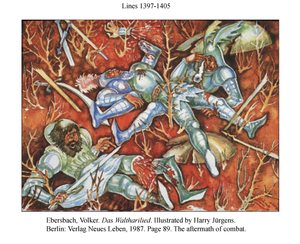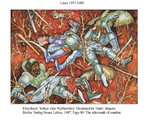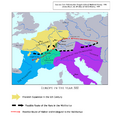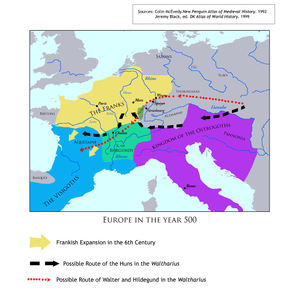Waltharius1396
Having wounded each other, the warriors end the battle, drink together, and engage in a friendly exchange of humorous taunt (1396–1442)
| Tali negotio dirimuntur proelia facto. | Aeineid 5.467: proelia voce diremit. ‘With his voice he broke off the fight.’
|
??????? | ||||
| Quemque suum vulnus atque aeger anhelitus arma | Aeineid 5.432: quatit aeger anhelitus artus. ‘A painful gasping shakes his huge frame.’
|
DSSDDS Elision: atque aeger False quantities: vulnus |
||||
| Ponere persuasit. quisnam hinc immunis abiret, | DSSSDS Elision: quisnam hinc |
|||||
| Qua duo magnanimi heroes tam viribus aequi | Aeineid 6.649: magnanimi heroes. . . ‘High-souled heroes. . .’ 12.230-231.: viribus aequi/ non sumus? ‘Are we not their match in might?’
|
DDSSDS Elision: magnanimi heroes |
||||
| Quam fervore animi steterant in fulmine belli? | 1400 | Aeneid 6.842: fulmina belli. . . ‘Thunderbolts of war. . .’
|
SDDSDS Elision: fervore animi |
|||
| Postquam finis adest, insignia quemque notabant: | Insignia equiv. to vulnera, ironic.
|
SDSDDS | ||||
| Illic Guntharii regis pes, palma iacebat | SDSSDS | 1402-3 Vogt-Spira suggest that avaritia (greed) and ira (rage) are depicted as driving forces of the epic plot and are also judged as deadly sins (Vogt-Spira 1994 p17) The collection of body parts resembles the punishment for sinners in Mark 9:42-48: "And if your hand causes you to sin, cut it off; it is better for you to enter life maimed than with two hands to go to Hell, to the unquenchable fire. And if your foot causes you to sin, cut it off; it is better for you to enter life lame than with two feet to be thrown into Hell. And if your eye causes you to sin, pluck it out; it is better for you to enter the kingdom of God with one eye than with two eyes to be thrown into Hell, where the worm does not die, and the fire is not quenched." The injuries depict the three surviving characters equally as sinners. Difficult to decide if this should be read as bucolically humorous or as a nauseous effect. BK | ||||
| Waltharii nec non tremulus Haganonis ocellus. | DSDDDS | |||||
| Sic sic armillas partiti sunt Avarenses! |
|
SSSSDS | ||||
| Consedere duo, nam tertius ille iacebat, | 1405 | Tertius: Gunther
|
Aeineid 7.431: consedere duces. ‘Burn the chiefs.’
|
SDSDDS | Althof: Aen 12.396– not in the wiki – Althof also disagrees with that allusion because in Aen the flowers are used to heal and here they are just used to wipe the wounds clean. Yet, there could be a healing herbal meaning in Waltharius, too. BK | |
| Sanguinis undantem tergentes floribus amnem. | Aeineid 10.908: undantique. . .cruore. . . ‘In streams of blood. . .’
|
DSSSDS | ||||
| Haec inter timidam revocat clamore puellam | Aeineid 4.303: vocat clamore Cithaeron. ‘Cithaeron summons her with its din.’ 2.437: vocati clamore. ‘We are called by the clamour.’
|
SDDSDS | ||||
| Alpharides, veniens quae saucia quaeque ligavit. | Saucia quaeque equiv. to vulnera omnia
|
DDSDDS | The Germanic tradition attaches the power of healing to women. Althof offers various examples. BK | |||
| His ita compositis sponsus praecepit eidem: | DDSSDS | |||||
| Iam misceto merum Haganoni et porrige primum; | 1410 | SDDSDS Elision: Haganoni et Hiatus: merum Haganoni |
Kratz (1984: xviii) suggests that the final scene in the Waltharius is based on a scene from Prudentius' Psychomachia (606-63) where the virtues rest and refresh themselves after combat. BK | |||
| Est athleta bonus, fidei si iura reservet. | Si: sc. modo
|
SDDSDS | ||||
| Tum praebeto mihi, reliquis qui plus toleravi. | SDDSDS | 1413-15 Gunther is marked as the weakest of the remaining warriors; he is marked as an anti-hero that failed in his ‘suberbus’. BK | ||||
| Postremum volo Guntharius bibat, utpote segnis | SDDDDS | |||||
| Inter magnanimum qui paruit arma virorum | SDSDDS | |||||
| Et qui Martis opus tepide atque enerviter egit.' | 1415 | Aeneid 8.516: militiam et grave Martis opus. . . ‘Warfare and the stern work of battle. . .’
|
SDDSDS Elision: tepide atque; atque enerviter |
|||
| Obsequitur cunctis Heririci filia verbis. | DSDSDS | |||||
| Francus at oblato licet arens pectore vino | DSDSDS | |||||
| Defer' ait 'prius Alpharidi sponso ac seniori, | DDDSDS Elision: sponso ac |
|||||
| Virgo, tuo, quoniam, fateor, me fortior ille | DDDSDS | |||||
| Nec solum me, sed cunctos supereminet armis.' | 1420 | Aeineid 6.856: victorque viros spereminet omnes. ‘He towers triumphant over all.’
|
SSSDDS | |||
| Hic tandem Hagano spinosus et ipse Aquitanus, | Spinosus: cf. note on line 1351.
|
SDSDDS Elision: ipse Aquitanus Hiatus: tandem Hagano |
Hagano spinosus Crosslingual mocking of the thorny Hagen. See v1351 and the respective comment. In contrast to the earlier occasion, where a character mocked Hagen, here the narrator is involved. This clearly alters the level and attaches authorial value to the mocking. It also preludes the following mocking of the heroes in the narrators voice. BK | |||
| Mentibus invicti, licet omni corpore lassi, | DSDSDS | |||||
| Post varios pugnae strepitus ictusque tremendos | DSDSDS | |||||
| Inter pocula scurrili certamine ludunt. | Georgics 2.383-384.: inter pocula laeti. . .saluere. ‘Amid their drinking they gaily danced.’
|
SDSSDS | ||||
| Francus ait: iam dehinc cervos agitabis, amice, | 1425 | Georgics 3.409: agitabis onagros. ‘You will course the wild ass.’
|
DSSDDS False quantities: extra syllable |
1425-28 Mockingly, a prosthesis made of a stuffed glove is suggested for the missing hand. Pliny mentions a hand prosthesis in his Naturalis Historiae VII, 29. According to him, Marcus Sergius used a replacement hand made of iron. We lack any evidence for further prosthesis before the 15th century. BK | ||
| Quorum de corio wantis sine fine fruaris: | Wantis: “gloves,” a Germanism, cf. French gants. Fruaris equiv. to utaris
|
SDSDDS | ||||
| At dextrum, moneo, tenera lanugine comple, | Eclogue 2.51: cana legam tenera lanugine mala. ‘I will gather quinces, pale with tender down.’
|
SDDSDS | ||||
| Ut causae ignaros palmae sub imagine fallas. | SSSDDS Elision: causae ignaros |
|||||
| Wah! sed quid dicis, quod ritum infringere gentis | Ritum…gentis: cf. line 337.
|
Liber I Macchabeorum 1.66: noluerunt infringere legem Dei sanctam. ‘They would not break the holy law of God.’ Liber Genesis 34.22: ritum gentis imitantes. . . ‘Following the manner of the nation.’
|
SSSSDS Elision: ritum infringere |
|||
| Ac dextro femori gladium agglomerare videris | 1430 | Videris: passive
|
Aeineid 2.341: lateri adglomerant nostro. ‘They gather to our side.’
|
SDDDDS Elision: gladium agglomerare |
||
| Uxorique tuae, si quando ea cura subintrat, | Aeineid 9.757: si continuo victorem ea cura subisset. . . ‘If at once the victor had taken thought. . .
|
SDSDDS Elision: quando ea |
Sexual pun in subintrat – to enter. BK | |||
| Perverso amplexu circumdabis euge sinistram? | SSSDDS Elision: perverso amplexu |
Perverso makes clear that there is a right or correct hand and a wrong hand. Walther has to use his left hand in an up-side-down manner. See also comment on the preceding verse. BK | ||||
| Iam quid demoror? en posthac tibi quicquid agendum est, | SDSDDS Apheresis: agendum est |
|||||
| Laeva manus faciet.' cui Walthare talia reddit: | Aeineid 2.323: talia reddit. ‘He answers thus.’
|
DDSDDS | ||||
| Cur tam prosilias, admiror, lusce Sicamber: | 1435 | Sicamber equiv. to France. The Sicambri were an ancient Germanic tribe who lived along the Rhine, connected by tradition with the Frankish royal line.
|
SDSSDS | |||
| Si venor cervos, carnem vitabis aprinam. | SSSSDS | |||||
| Ex hoc iam famulis tu suspectando iubebis | Ex hoc: sc. tempore Suspectando: sc. oblique
|
SDSSDS | ||||
| Heroum turbas transversa tuendo salutans. | Eclogue 3.8: transversa tuentibus hircis. . . ‘While the goats looked askance. . .’
|
SSSDDS | ||||
| Sed fidei memor antiquae tibi consiliabor: | DDSDDS | |||||
| Iam si quando domum venias laribusque propinques, | 1440 | SDDDDS | ||||
| Effice lardatam de multra farreque pultam: | Lardatam: “fattened” Multra equiv. to lacte
|
DSSSDS | ||||
| Haec pariter victum tibi conferet atque medelam. | Medelam: “medicine,” i.e., a poultice for the eye.
|
DSDDDS |



